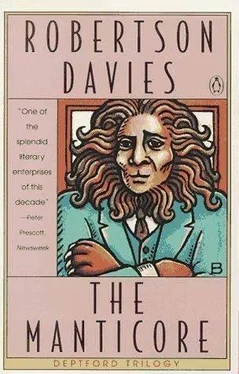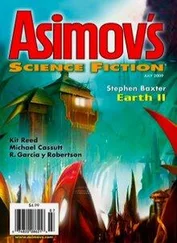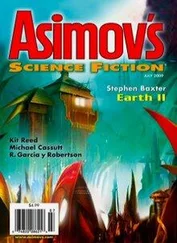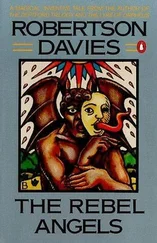Robertson Davies - The Manticore
Здесь есть возможность читать онлайн «Robertson Davies - The Manticore» весь текст электронной книги совершенно бесплатно (целиком полную версию без сокращений). В некоторых случаях можно слушать аудио, скачать через торрент в формате fb2 и присутствует краткое содержание. Жанр: Триллер, на английском языке. Описание произведения, (предисловие) а так же отзывы посетителей доступны на портале библиотеки ЛибКат.
- Название:The Manticore
- Автор:
- Жанр:
- Год:неизвестен
- ISBN:нет данных
- Рейтинг книги:3 / 5. Голосов: 1
-
Избранное:Добавить в избранное
- Отзывы:
-
Ваша оценка:
- 60
- 1
- 2
- 3
- 4
- 5
The Manticore: краткое содержание, описание и аннотация
Предлагаем к чтению аннотацию, описание, краткое содержание или предисловие (зависит от того, что написал сам автор книги «The Manticore»). Если вы не нашли необходимую информацию о книге — напишите в комментариях, мы постараемся отыскать её.
The Manticore — читать онлайн бесплатно полную книгу (весь текст) целиком
Ниже представлен текст книги, разбитый по страницам. Система сохранения места последней прочитанной страницы, позволяет с удобством читать онлайн бесплатно книгу «The Manticore», без необходимости каждый раз заново искать на чём Вы остановились. Поставьте закладку, и сможете в любой момент перейти на страницу, на которой закончили чтение.
Интервал:
Закладка:
MYSELF: No. And yet… there was always something about him that held the imagination. He was an oddity, as I've said. But a man who never seemed to come to anything. He wrote some books, and Father said some of them sold well, but they were queer stuff, about the nature of faith and the necessity of faith – not Christian faith, but some kind of faith, and now and then in classes he would point at us and say, "Be sure you choose what you believe and know why you believe it, because if you don't choose your beliefs, you may be certain that some belief, and probably not a very creditable one, will choose you." Then he would go on about people whose belief was in Youth, or Money, or Power, or something like that, and who had found that these things were false gods. We liked to hear him rave, and some of his demonstrations from history were very amusing, but we didn't take it seriously. I have always looked on him as a man who missed his way in life. Father liked him. They came from the same village.
DR. VON HALLER: But you never felt any urge to learn from him?
MYSELF: What could he have taught me, except history and the Plain Style?
DR. VON HALLER: Yes, I see. It seemed to me for a time that he had something of the quality of a Magus.
MYSELF: In your Comedy Company, or Cabinet of Archetypes, you don't seem to have any figure that might correspond to my father.
DR. VON HALLER: Oh, do not be impatient. These are the common figures. You may depend on it that your father will not be forgotten. Indeed, it seems to me that he has been very much present ever since we began. We talk of him all the time. He may prove to be your Great Troll…
MYSELF: Why do you talk of trolls? It seems to me that you jungians sometimes go out of your way to make yourselves absurd.
DR. VON HALLER: Trolls are not Jungian; they are just part of my promise not to annoy you with jargon. What is a troll?
MYSELF: A kind of Scandinavian Spock, isn't it?
DR. VON HALLER: Yes, Spock is a very good word for it – another.Scandinavian word. Sometimes a troublesome goblin, sometimes a huge, embracing lubberfiend, sometimes an ugly animal creature, sometimes a helper and server, even a lovely enchantress, a true Princess from Far Away: but never a full or complete human being. And the battle with trolls that Ibsen wrote about is a good metaphor to describe the wrestling and wrangling we go through when the archetypes we carry in ourselves seem to be embodied in people we have to deal with in daily life.
MYSELF: But people are people, not trolls or archetypes.
DR. VON HALLER: Yes, and our great task is to see people as people and not clouded by archetypes we carry about with us, looking for a peg to hang them on.
MYSELF: Is that the task we are working at here?
DR. VON HALLER: Part of it. We take a good look at your life, and we try to lift the archetypes off the pegs and see the people who have been obscured by them.
MYSELF: And what do I get out of that?
DR. VON HALLER: That depends on you. For one thing, you will probably learn to recognize a Spock when you see one, and keep trolls in good order. And you will recover all these projections which you have visited on other people like a magic lantern projecting a slide on a screen. When you stop doing that you are stronger, more independent. You have more mental energy. Think about it. And now go on about the genealogist
12
I didn't pay much attention to him, because as I told Dr. von Haller, I was greatly taken up with my final year of law studies. Pargetter expected me to get a First, and I wanted it even more than he. The notes kept arriving with reports of nothing achieved in spite of impressive activity. I had written to Father that I had a good man on the job, and had his permission to advance money as it was needed. Pledger-Brown's accounts were a source of great delight to me; I felt like Diogenes, humbled in the presence of an honest man. Sometimes in the vacations he went off hunting Stauntons and sent me bills detailing third-class tickets, sixpenny rides on buses, shillings spent on beer for old men who might know something, and cups of tea and buns for himself. There was never any charge for his time or his knowledge, and when I asked about that he replied that we would agree on a fee when he produced his results. I foresaw that he would starve on that principle, but I cherished him as an innocent. Indeed, I grew to be very fond of him, and we were Adrian and Davey when we talked. His besotted enthusiasm for the practise of heiraldry refreshed me; I knew nothing about it, and couldn't see the use of it, and wondered why anybody bothered with it, but in time he brought me to see that it had once been necessary and was still a pleasant personal indulgence, and – this was important – that using somebody else's armorial bearings was no different in spirit from using his name; it was impersonation. It was, in legal terms, no different from imitating a trade-mark, and I knew what that meant. Undoubtedly Pledger-Brown was the best friend I made at Oxford, and I keep up with him still. He got into the College of Heralds, by the way, and is now Clarencieux King of Arms and looks exceedingly peculiar on ceremonial occasions in a tabard and a hat with a feather.
What finally bound us into the kind of friendship that does not fade was complicity in a secret.
Early in the spring term of my third year, when I was deep in work for my Final Schools, a message arrived: "I have found Henry Staunton. A.P-B." I had a mountain of reading to do and had planned to spend all afternoon at the Codrington, but this called for something special, so I got hold of Adrian and took him to lunch. He was as nearly triumphant as his diffident nature would allow.
"I was just about to offer you a non-grandfather," said he; "there was a connection of the Stauntons of Warwickshire – not a Longbridge Staunton but a cousin – who cannot be accounted for and might perhaps have gone to Canada at the age of eighteen or so. By a very long shot he might have been your grandfather; without better evidence it would be guesswork to say he was. But then during the Easter vacation I had a flash. You otiose ass, Pledger-Brown, I said to myself, you've never thought of Staunton as a place-name. It is an elementary rule in this work, you know, to check place-names. There is Staunton Harold in Leicestershire and two or three Stantons, and of course I had quite overlooked Staunton in Gloucestershire. So off I went and checked parish records. And there he was in Gloucestershire: Albert Henry Staunton, born April 4, 1866, son of Maria Ann Dymock, and if you can find a better West Country name than Dymock, I'd be glad to hear it."
"What kind of Staunton is he?" I asked.
"He's an extraordinarily rum Staunton," said PledgerBrown, "but that's the best of it. You get not only a grandfather but a good story as well. You know, so many of these forbears that people ferret out are nothing at all; I mean, perfectly good and reputable, but no personal history of any interest. But Albert Henry is a conversation-piece. Now listen.
"Staunton is a hamlet about ten miles north-west of Gloucester, bearing over toward Herefordshire. In the middle of the last century it had only one public house, called the Angel, and by rights it ought to have been near a church named for the Annunciation, but it isn't. That doesn't matter. What is important is that in the 1860s there was an attractive girl working at the Angel who was called Maria Ann Dymock, and she must have been a local Helen, because she was known as Mary Dymock the Angel."
"A barmaid?" I asked, wondering how Father was going to take to the idea of a barmaid.
"No, no," said Adrian; "barmaids are a bee in the American bonnet. A country pub of that time would be served by its landlord. Maria Ann Dymock was undoubtedly a domestic servant. But she became pregnant, and she said the child's father was George Applesquire, who was the landlord of the Angel. He denied it and said it could have been several other men. Indeed, he said that all Staunton could claim to be the child's father, and he would have nothing to do with it. He or his wife turned Maria Ann out of the Angel.
Читать дальшеИнтервал:
Закладка:
Похожие книги на «The Manticore»
Представляем Вашему вниманию похожие книги на «The Manticore» списком для выбора. Мы отобрали схожую по названию и смыслу литературу в надежде предоставить читателям больше вариантов отыскать новые, интересные, ещё непрочитанные произведения.
Обсуждение, отзывы о книге «The Manticore» и просто собственные мнения читателей. Оставьте ваши комментарии, напишите, что Вы думаете о произведении, его смысле или главных героях. Укажите что конкретно понравилось, а что нет, и почему Вы так считаете.












